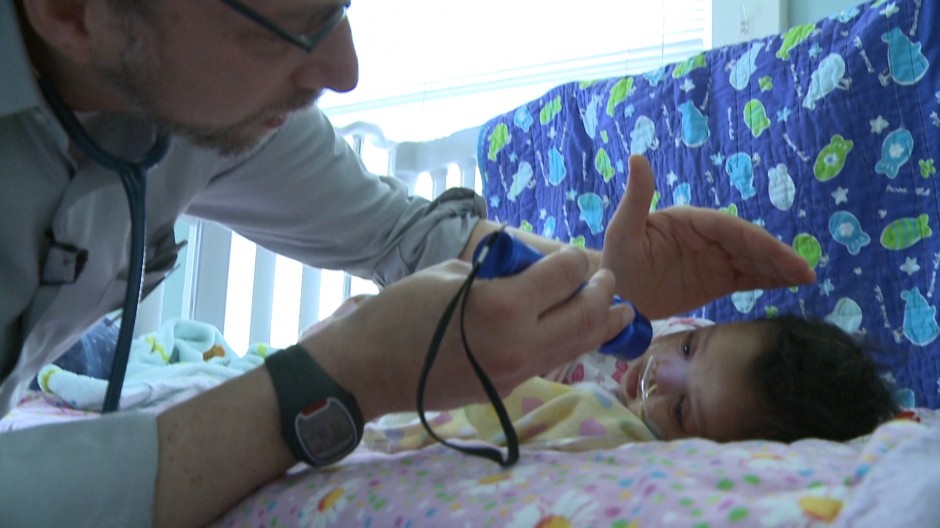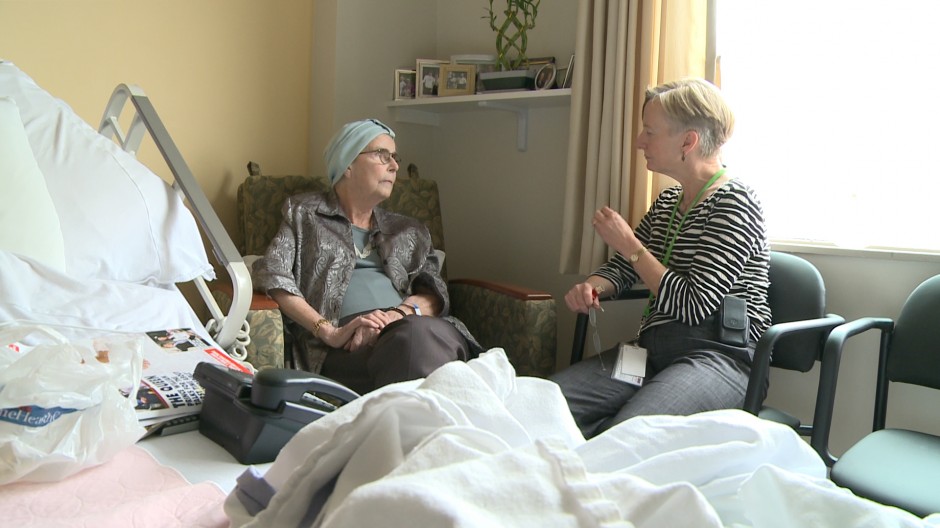
In a scene from “Faces of Palliative Care,” Hal Siden, Medical Director at Canuck Place Children’s Hospice and Clinical Associate Professor of Pediatrics, examines Jay Sato, an infant with a life-threatening brain tumour.
Palliative care brings to mind hopelessness and helplessness, and is often viewed with suspicion and fear by the general public – and even by some health care practitioners.
Patricia Boston, determined to dispel that image, wound up reaching a far larger audience than she ever imagined.
A Clinical Professor in the Department of Family Practice and the former Director of the Division of Palliative Care, Dr. Boston decided that video would best convey how thoroughly end-of-life care has been transformed by new drugs and a collaborative, interprofessional approach.
“Most palliative care teaching does not speak to the heart, and doesn’t fully convey the interaction between providers and patients,” Dr. Boston says.
With a $123,526 grant from UBC’s Teaching and Learning Enhancement Fund, she began collaborating with Doug Nicolle, the Senior Media Producer for Providence Health Care, who became her co-producer and director. Together, they began looking for stories that would convey how much palliative care has evolved.
Beyond the book
They found willing patients and families, including a woman diagnosed with pancreatic cancer, and an 8-month-old with a brain tumour. They captured the activities of palliative care teams at Vancouver General Hospital, Richmond Hospital, the Richmond Hospice and the Canuck Place Children’s Hospice.
“We wanted actual portrayals of people’s experience to convey human truths that complement and perhaps even go beyond what we might read in a book,” Dr. Boston says. “We wanted to show the range of care, from hospitals to hospices to patients’ homes. And we wanted to emphasize the importance of symptom management.”
When “Faces of Palliative Care” was shown two years later to students, health providers and some members of the public, initial reviews were glowing, with many evaluations recommending that the film get wider exposure. Encouraged by that reception, Dr. Boston and Nicolle took the film to the CBC.

In a scene from “Faces of Palliative Care,” Clinical Professor Romayne Gallagher counsels a patient at the Marion Hospice.
The broadcaster’s reaction: Thumbs-up.
But transforming “Faces of Palliative Care” from an instructional video into a mainstream television documentary – complete with commercial breaks – required months of editing by Nicolle and the CBC.
The finished product had its television premiere in June 2013, as part of the “Absolutely Vancouver” summer series of documentaries in British Columbia. It was re-broadcast twice in early September, also in B.C. The network plans to air the documentary nationally in the coming months.
Breaking out of the lecture hall
“This will expose so many more people to the principles of palliative care,” Dr. Boston says. “Medical education, rightly, is usually small-scale. At its largest, the audience is limited by the size of a lecture hall. I never imagined being able to reach so many people, and doing so in such a meaningful way.”
The documentary follows several palliative care specialists in the Faculty of Medicine, including:
- Hal Siden, Medical Director at Canuck Place Children’s Hospice and Clinical Associate Professor in the Department of Pediatrics
- Pippa Hawley, Palliative Medicine Specialist, Pain and Symptom Management/Palliative Care Team Leader, BC Cancer Agency and Clinical Assistant Professor in the Department of Medicine
- Beverly Spring, Medical Director, Vancouver Palliative Care Home Hospice Program and Clinical Assistant Professor in the Department of Family Practice
- Romayne Gallagher, Physician Program Director, Palliative Care Program, Providence Health Care and Clinical Professor in the Department of Family Practice
- Alan Nixon, Palliative Care Physician, Richmond and Clinical Associate Professor in the Department of Family Practice
- Wendy Yeomans, Medical Director at the Palliative Care Program at Vancouver General Hospital and Clinical Instructor in the Department of Family Practice